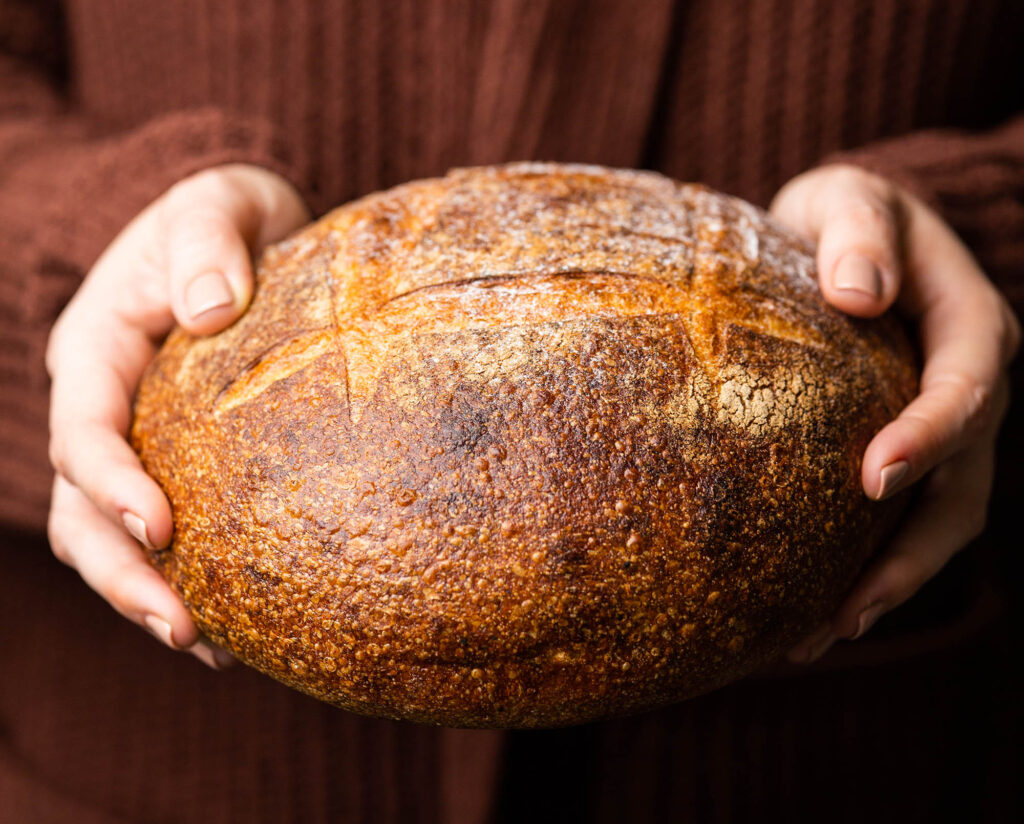For a while, it seemed like nearly every naturopath, nutritionist and health practitioner was recommending avoiding gluten for hormone balance. Both gluten and dairy have become demonised and greatly feared in the health space. Gluten brings with it claims of causing leaky gut and inflammation, including brain inflammation. Inflammation is a top root cause of hormonal imbalance and it is often necessary to reduce inflammation to bring hormones back into line. Today I wanted to explore what the evidence really has to say about removing gluten for hormone health and general health.
Gluten is a protein found in grains like wheat, barley and rye and to a lesser degree grains like spelt. Oats are naturally gluten-free but can be contaminated with gluten as they are often processed in machinery that also processes gluten-containing grains. For those diagnosed with celiac disease (an autoimmune disease where the body reacts to gluten) avoiding gluten is an absolute must for life. Untreated celiac disease is strongly linked with many hormonal imbalances including Hashimoto’s thyroiditis, Graves Disease (autoimmune thyroid disorders), Diabetes Mellitus and various other autoimmune diseases suggesting an increased prevalence of celiac disease in people that already suffer autoimmunity (1). However, at most, true celiac disease is present in only 1% of the western population (1) and even with the presence of other autoimmune conditions the risk increases from 2-19% with the highest prevalence being found mostly in people with diabetes mellitus (1). However, studies clearly show that consumption of gluten-containing whole grains actually have an inverse relationship with diabetes risk, meaning consuming gluten-containing whole grains can help lower the risk of developing diabetes in both men and women (3) and therefore gluten should only be avoided if celiac disease is confirmed even amongst people with diabetes. Women with celiac disease have been shown to have increased menstrual cycle disturbances, especially in the form of irregular periods or abnormal bleeding patterns (2). Based on this knowledge, it is recommended that anyone that reacts to eating gluten should be tested to rule out celiac disease. This is even more important if there is already an underlying autoimmune condition as this places people at greater risk of celiac disease.
Outside of celiac disease, there are other reactions to gluten-containing grains (mostly wheat) that need to be ruled out. These include wheat allergies of various types as well as non-celiac gluten sensitivity. Wheat allergies involve allergic reactions to other compounds found in wheat and not gluten itself (4). Non-celiac gluten sensitivity is when there is a reaction to gluten that is usually localised to the gut and is less serious than celiac disease. Amongst many health professionals, non-celiac gluten sensitivity is communicated to be very common amongst the population and is often recommended to be avoided in order to achieve hormone balance. However, some of our best scientific data only estimate an absolute max of 6% of the population having non-celiac gluten sensitivity (4).
With estimates for both celiac and non-celiac gluten sensitivity being so low, why is gluten so greatly feared?
There are two main claims about gluten being detrimental to overall health.
Gluten causes leaky gut: We do have some evidence that has been repeated in a few studies showing that gluten does cause leaky or increasing intestinal permeability. However, all of this evidence only pertains to people that already have celiac disease or non-celiac gluten sensitivity and does not pertain to individuals that do not have these conditions (5). There is some evidence that people with IBS (irritable bowel syndrome) may have increased leaky gut from gluten but this is not conclusive as other factors are often at play (7). I have only been able to find one study that shows increased leaky gut in all people even those without celiac or gluten sensitivity (6) however this study was done examining tissue collected via biopsy and not in humans themselves and was done with isolated gluten compounds (gliadin) and not with gluten in its natural form found in the whole grain. While this could lead to the assumption that gluten can therefore be singled out as being the sole cause of leaky gut, it is not a true representation of how gluten is consumed in the population and therefore is unlikely to be accurate. As it stands there is no current evidence suggesting that gluten creates leaky gut in otherwise healthy individuals that do not have celiac disease, non-celieac gluten sensitivity, wheat allergy or some rare cases of IBS (8) (9).
Gluten causes brain inflammation: there are claims that gluten and cross the blood-brain barrier and cause inflammation in the brain. While it is true that individuals that do have increased gut permeability due to gluten can have gluten and other toxins affect brain tissues, again this is only observed in people that have celiac disease and is not the case for otherwise healthy individuals (10). A mini-review study entitled “Leaky Gut Leaky Brain?” concluded that “there is just not enough evidence to suggest that one should eliminate gluten from the diet or eat gluten-free, or that everyone should stop eating gluten-containing foods”(10).
Despite this research many women genuinely do feel better when they avoid gluten, so why is this?
Gluten intolerance is more common in women than men (11). A possible explanation of this is the widespread use of hormonal contraception. We have good evidence showing the use of contraceptive pills and hormone replacement therapy in menopausal women increases the risk of developing inflammatory bowel diseases such as chrones or ulcerative colitis (12) while also negatively impacting the gut microbiome and increasing the risk of autoimmunity including celiac disease and Hashimoto’s thyroiditis (12). The contraceptive pill can shift the gut microbiome and cause a whole host of digestive problems that do not only pertain to gluten.
It is important to note that gluten is not the only component of grains that can have unwanted side effects. A study done on people with self-reported non-celiac gluten sensitivity was able to demonstrate that gluten itself had no side effects when compared to fructans found in grains. (13) Fructans are a specific type of fibre found in wheat, barley and rye that has been identified as a FODMAP fibre that is known to create digestive upset in some people. Fructans in themselves are healthy however a fairly large majority of the population has trouble digesting them. It is highly probable, based on the evidence and current statistics, that the majority of people with self-reported non-celiac gluten sensitivity are likely reacting to fructans and not the gluten itself. Women reacting to fructans may see improvements in overall hormone balance once fructans are removed as it can help to lower inflammation however the gut can become accustomed to digesting fructans over time with the slow introduction of fructan fibres. Unlike true celiac disease, people can learn to enjoy foods containing fructans by working on fixing imbalances in the microbiome. Avoiding fructan containing foods for long periods of time shows negative health outcomes long term.
Based on the information I have presented above, it is easy to see that if a woman has a true gluten sensitivity, then it can and will affect her hormone balance. Inflammation is a root cause of hormonal imbalance and can alter the menstrual cycle, nervous system and metabolism. Outside of true gluten sensitivity or celiac disease we have no evidence that avoiding gluten is beneficial for women’s hormone balance, in fact, it may do more harm than good. Women who are sensitive to fructans found in grains may similarly find improvements to their hormones when they remove fructans from their diet by means of reducing inflammation but this is not an ideal solution long term as restriction of fibre can diminish good bacteria in the gut and lead to poorer health consequences in the long run.
What we do know is that most gluten-containing foods on the market are not healthful. The vast majority of gluten consumption occurs through white bread, white pasta, pastries, cakes and other processed foods. These foods are void of beneficial fibres and nutrients and are high on the glycemic index. They have vastly different effects to consuming good quality gluten-containing grains like organic whole grains and flours (and therefore free of pesticides like glyphosates which some people claim to be the problem with gluten). Minimally processed gluten-containing whole grains are healthful and have good data supporting their role in health and longevity including hormonal conditions like PCOS. In fact, one study found a reduction of PCOS symptoms of 64% just by eating whole grain products including gluten-containing products. Processed white flour products do not have positive health outcomes and are associated with a number of hormonal imbalances in women. For more information about how processed carbohydrates and whole carbohydrates affect women’s hormones please read my carbohydrate article here: https://hazelandcacao.com/how-carbohydrates-effect-womens-hormones/
To conclude:
At most only 6% of the population has a true issue with gluten. Women with true celiac disease must avoid gluten for life. Most other women are likely reacting to fructans contained in various grains and not gluten itself. Removing grains may help hormones balance short term by means of lowering acute inflammation but has poorer health outcomes long term. Most women can work on rebalancing the gut microbiome so that they can consume grains containing gluten and fructans. Help from a professional may be needed. If gluten can not be consumed, great care should be taken to ensure a variety of other non-gluten-containing grains are consumed. The most healthful approach for women who do not have celiac disease is to eat a variety of different whole grains including gluten-containing grains and minimise processed grain products like white bread, cakes and pastries.
References:
- https://www.ncbi.nlm.nih.gov/pmc/articles/PMC2111403/
- https://pubmed.ncbi.nlm.nih.gov/24471897/
- https://pubmed.ncbi.nlm.nih.gov/30074058/
- https://bmcmedicine.biomedcentral.com/articles/10.1186/1741-7015-10-13
- https://www.ncbi.nlm.nih.gov/pmc/articles/PMC7353361/
- https://pubmed.ncbi.nlm.nih.gov/25734566/
- https://pubmed.ncbi.nlm.nih.gov/23357715/
- https://bmcmedicine.biomedcentral.com/articles/10.1186/1741-7015-9-23
- https://pubmed.ncbi.nlm.nih.gov/21224837/
- https://pubmed.ncbi.nlm.nih.gov/30340384/
- https://pubmed.ncbi.nlm.nih.gov/15841709/
- https://pubmed.ncbi.nlm.nih.gov/26658991/
- https://pubmed.ncbi.nlm.nih.gov/29102613/
- https://www.ncbi.nlm.nih.gov/pmc/articles/PMC5894473/










